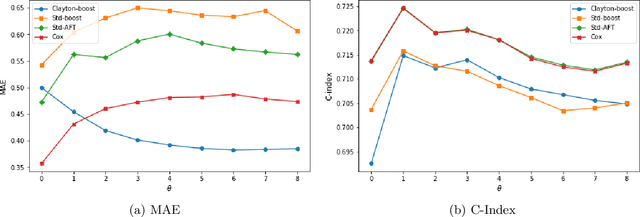A copula-based boosting model for time-to-event prediction with dependent censoring
Paper and Code
Oct 10, 2022



A characteristic feature of time-to-event data analysis is possible censoring of the event time. Most of the statistical learning methods for handling censored data are limited by the assumption of independent censoring, even if this can lead to biased predictions when the assumption does not hold. This paper introduces Clayton-boost, a boosting approach built upon the accelerated failure time model, which uses a Clayton copula to handle the dependency between the event and censoring distributions. By taking advantage of a copula, the independent censoring assumption is not needed any more. During comparisons with commonly used methods, Clayton-boost shows a strong ability to remove prediction bias at the presence of dependent censoring and outperforms the comparing methods either if the dependency strength or percentage censoring are considerable. The encouraging performance of Clayton-boost shows that there is indeed reasons to be critical about the independent censoring assumption, and that real-world data could highly benefit from modelling the potential dependency.
 Add to Chrome
Add to Chrome Add to Firefox
Add to Firefox Add to Edge
Add to Edge